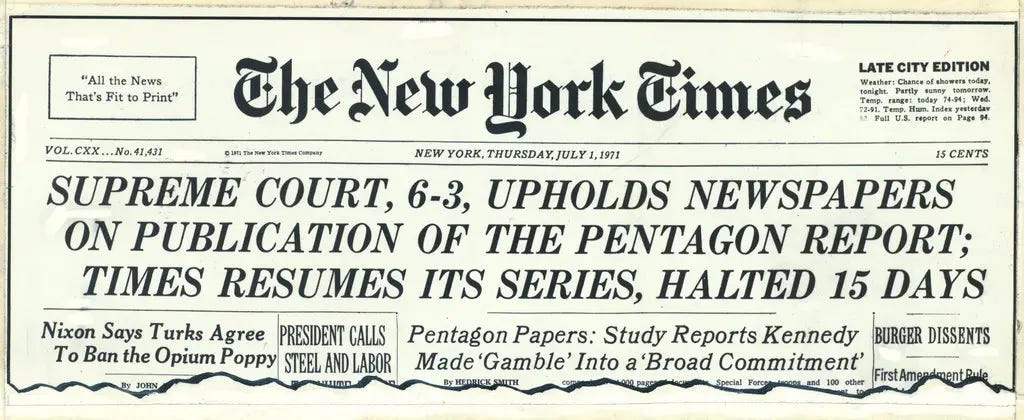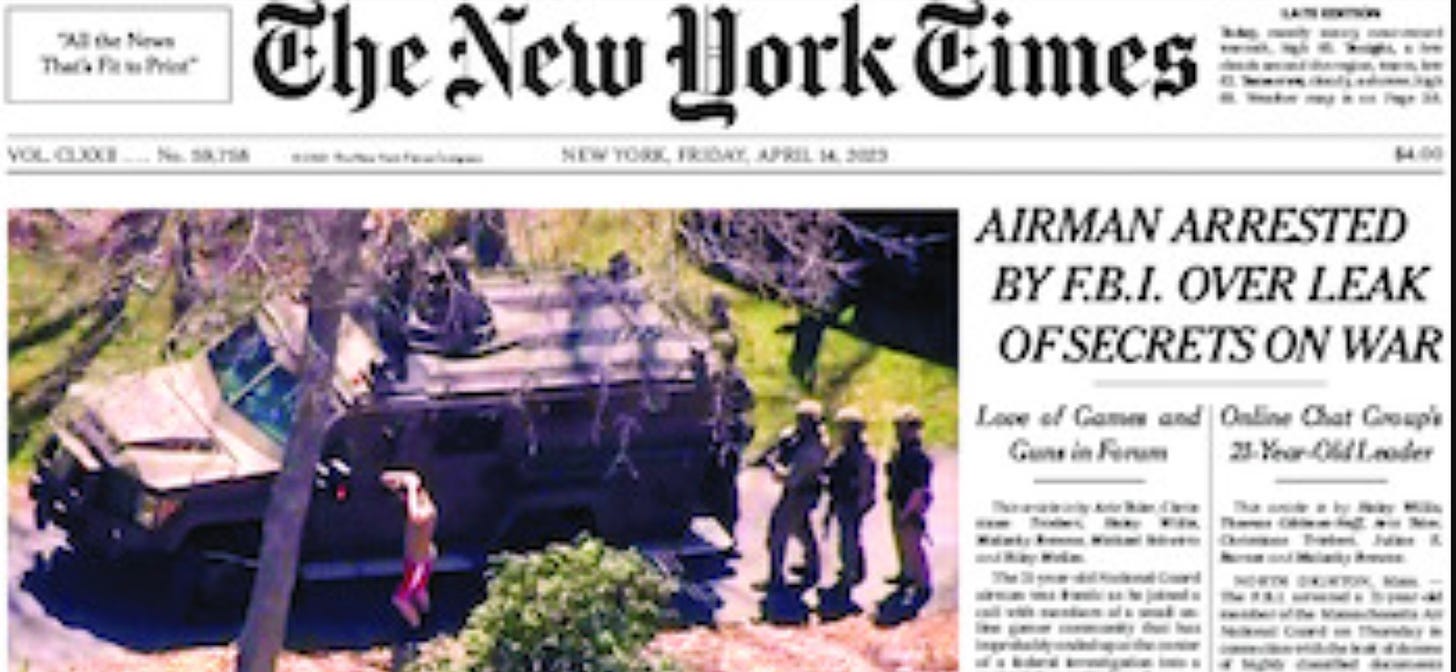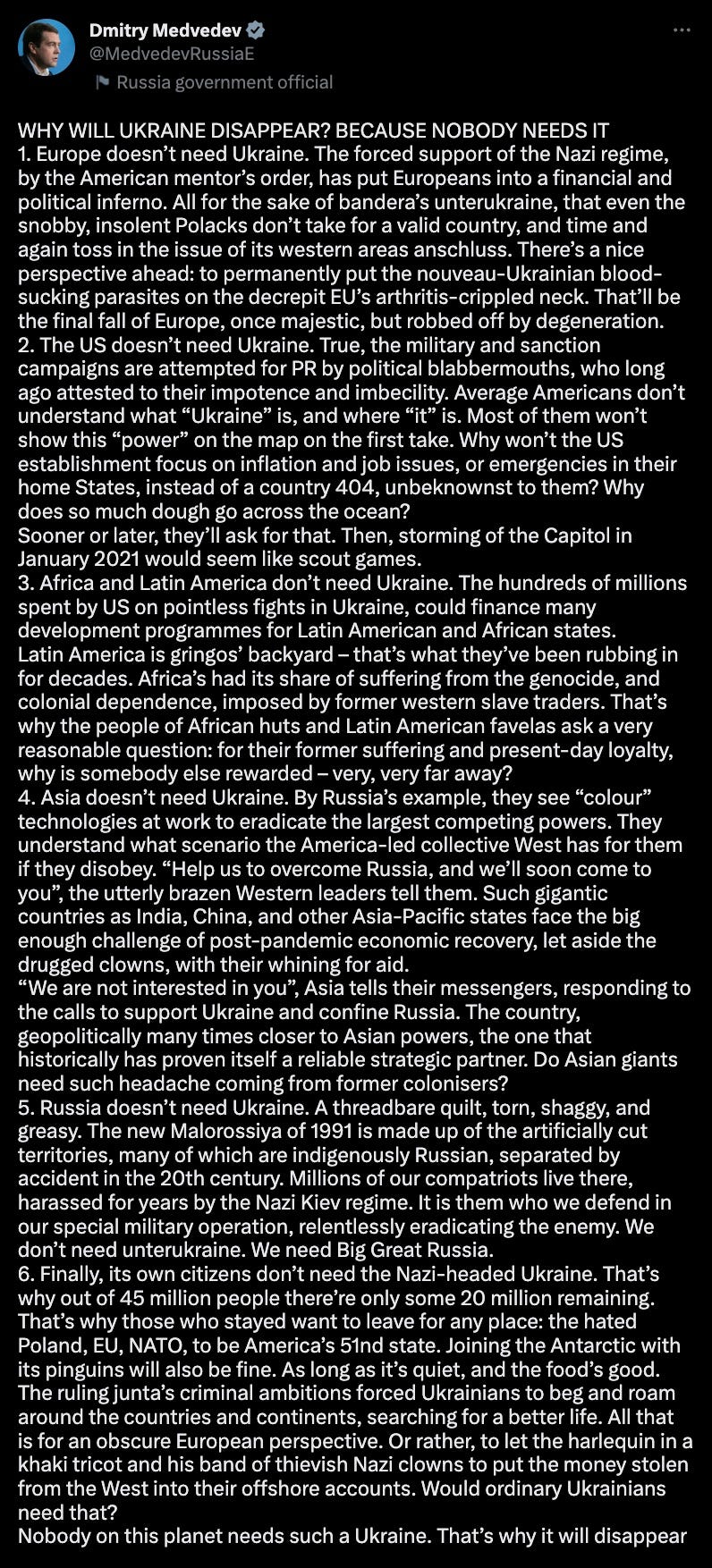

Discover more from @amuse
The New York Times Would Work with Government to Conceal Pentagon Papers if Released Today
In the case of Airman Jack Teixeira the New York Times helped the government track him down.
Fifty-one years ago, Neil Sheehan1 and Hedrick Smith2 received 7,000 pages of classified intelligence known as The Pentagon Papers3 from Daniel Ellsberg4. They revealed that the government had lied to the American people about the Vietnam War over the course of multiple administrations. The government attempted to prevent The New York Times from publishing Sheehan and Smith’s reporting but the Supreme Court eventually ruled that the First Amendment protected the right of the Times to publish the papers and their publication is considered a landmark moment in the history of American journalism and the government's accountability to the public.5 In light of the apparent close collaboration between the media and government today I can’t help but wonder what the Times would do with a similar leak today.
UPDATE: Ironically, after I published this post The New York Times actually launched its own investigation into the identity of the leaker forcing the FBI to accelerate the arrest of the suspect. Meanwhile, the paper is concealing the contents of the leaked documents from the American people.
Interestingly, with the release of hundreds of highly classified documents about the Ukraine war, we are getting a firsthand glimpse into how the media has abdicated its responsibility to hold our government accountable. Together the documents reveal that the war is going much worse than the Biden administration has been claiming.6 They also reveal that very little of the money Washington has been funneling into Ukraine is making its way to the battlefield—with the Pentagon calling Ukraine a ‘black box’ when it comes to U.S. tax dollars.7
Instead of reporting on the classified document’s revelations, the New York Times focus is on how the documents are likely Russian disinformation.8 They seemingly have no interest whatsoever in asking tough questions when it comes to the prosecution of Biden’s proxy war against Russia. Similarly, Newsweek is suggesting that the classified documents might be a “Putin Ploy” to undermine support for Ukraine.9 Ironically, U.S. News & World Report is reporting that Russia is calling the classified documents disinformation as well—disinformation perpetrated by the Pentagon.10 Finally, Foreign Policy is reporting that the leaked documents will ‘complicate’ Ukraine’s spring counteroffensive by providing Russia with a tactical advantage.11
Literally, not a single U.S. media outlet is even slightly interested in whether or not the Biden administration has been lying to the American people about the war in Ukraine. They’re not interested in what the White House plans to do (if anything) about the misappropriation of U.S. tax dollars by Ukrainian politicians and military leaders. Just as the U.S. media seemed to willfully defy logic to regurgitate the CIA’s ‘theory’ that a Ukraine couple on a yacht masterminded the destruction of the Nord Stream pipeline—they’re tying themselves up in similar knots to avoid reporting on the real story—the fact that we’re losing our proxy war against Russia—badly.
DNyuz, an Armenian media outlet is one of the few actually reporting details from the leaked documents.12 From their coverage:
At the end of the day, Biden has made it clear that his proxy war with Russia can only end once Putin is removed from power. I don’t think he realizes who is poised to take power—I’m fairly certain that Russia’s new boss will be far worse than its current one:
We desperately need a free press in America.
Neil Sheehan was an American journalist and author who is best known for his coverage of the Vietnam War and his role in breaking the story of the Pentagon Papers for The New York Times. Sheehan was born on October 27, 1936, in Holyoke, Massachusetts, and grew up in a working-class family. He graduated from Harvard University in 1958 and served as a U.S. Army officer in Germany.
After his military service, Sheehan began his journalism career as a reporter for United Press International. In 1962, he joined The New York Times as a foreign correspondent, reporting on the war in Vietnam from 1962 to 1966. He later served as the Times' bureau chief in Southeast Asia from 1968 to 1971.
In 1971, Sheehan obtained a copy of the classified Pentagon Papers from his source, Daniel Ellsberg, and worked with his colleagues at The New York Times to report on the documents. The publication of the Pentagon Papers helped to expose the government's deception about the war and sparked a major legal and political controversy.
Sheehan received numerous awards for his journalism, including a Pulitzer Prize for his book "A Bright Shining Lie: John Paul Vann and America in Vietnam," which was based on his experiences covering the war. He also served as a professor of journalism at the University of California, Berkeley, and was a member of the Council on Foreign Relations. Sheehan died on January 7, 2021, at the age of 84.
Hedrick Smith is an American journalist, author, and documentary filmmaker, who was one of the main reporters for The New York Times during the publication of the Pentagon Papers. He was born on July 9, 1933, in Kilmacolm, Scotland, and grew up in New York City. Smith graduated from Williams College in 1955 and went on to study at Oxford University as a Rhodes Scholar.
After completing his studies, Smith began his career as a journalist, working for United Press International and The New York Times. He covered a wide range of topics, including politics, business, and foreign affairs, and won several awards for his reporting. Smith also served as the Times' bureau chief in Moscow from 1971 to 1974, where he covered the Soviet Union and Eastern Europe.
In addition to his journalism career, Smith has written several books and produced numerous documentaries. His book "The Russians" was a bestseller and won the Pulitzer Prize for General Nonfiction in 1972. He also produced and hosted the PBS documentary series "The Constitution: That Delicate Balance" and "Inside Gorbachev's USSR."
Smith has been recognized for his contributions to journalism and public service with numerous awards, including the George Polk Award, the Emmy Award, and the John Chancellor Award for Excellence in Journalism. He has also served as a fellow at Harvard University's Institute of Politics and as a visiting scholar at the Brookings Institution.
The Pentagon Papers were a classified study of the Vietnam War conducted by the U.S. Department of Defense from 1945 to 1967. In 1971, a former military analyst named Daniel Ellsberg leaked the papers to The New York Times and other newspapers, revealing a history of government deception about the war and undermining public support for the conflict. The Nixon administration tried to suppress the publication of the papers, claiming that they contained classified information that threatened national security.
Daniel Ellsberg, the former military analyst who leaked the Pentagon Papers to The New York Times and other newspapers, was prosecuted by the U.S. government for espionage and theft of government property. However, the case against him was eventually dismissed due to government misconduct, including illegal wiretapping and break-ins by the Nixon administration's "plumbers" unit. The revelations about the government's illegal activities during Ellsberg's trial, along with the broader scandal of the Watergate break-in, contributed to President Nixon's resignation in 1974.
Times Co. v. United States, 403 U.S. 713 (1971) The case arose when the U.S. government sought an injunction to prevent The New York Times and other newspapers from publishing stories based on the Pentagon Papers. The government argued that the publication of the papers would harm national security and violate the Espionage Act of 1917.
The case went to the Supreme Court, which ruled in favor of the newspapers in a 6-3 decision. The Court held that the government had not met its heavy burden of proving that the publication of the papers would cause "direct, immediate, and irreparable" harm to national security. The Court also noted that prior restraints on publication are "the most serious and least tolerable infringement on First Amendment rights."
The Court's decision in New York Times Co. v. United States was a landmark ruling for press freedom and has been cited as a significant precedent in First Amendment law.
Lafayette, David J., and Ian Brzezinski. "How (and When) Does the War in Ukraine End? The Need for a Grand Strategy." Center for Strategic and International Studies, 2 Feb. 2022, https://www.csis.org/analysis/how-and-does-war-ukraine-end-need-grand-strategy.
Lee, Matthew. "How Much Aid Has the U.S. Sent to Ukraine? Here Are Six Charts." Council on Foreign Relations, 28 Jan. 2022, https://www.cfr.org/article/how-much-aid-has-us-sent-ukraine-here-are-six-charts.
Zurcher, Anthony. "US and Ukraine Discuss Plan to Counter Russian Offensive." The New York Times, 6 Apr. 2023, https://www.nytimes.com/2023/04/06/us/politics/ukraine-war-plan-russia.html.
McDonald, Jessica. "Ukraine Leaked War Documents Reveal Counteroffensive Plan with Help from Pentagon." Newsweek, 26 Feb. 2022, https://www.newsweek.com/ukraine-leaked-war-documents-counteroffensive-pentagon-1793177.
Adams, Becket. "Russia Claims Leaked Pentagon Intelligence on Ukraine is U.S. Disinformation." U.S. News & World Report, 7 Apr. 2023, https://www.usnews.com/news/world-report/articles/2023-04-07/russia-claims-leaked-pentagon-intelligence-on-ukraine-is-u-s-disinformation.
de Luce, Dan. "Leaked Ukraine War Plans Trigger Russian Denials and U.S.-NATO Counteroffensive." Foreign Policy, 7 Apr. 2023, https://foreignpolicy.com/2023/04/07/ukraine-war-plans-leak-russia-us-nato-counteroffensive/.
DNYUZ." dnyuz.com, 8 Apr. 2023, https://dnyuz.com/2023/04/08/leaked-documents-reveal-depth-of-u-s-spy-efforts-and-russias-military-struggles/.
Subscribe to @amuse
@amuse (formerly Politique Republic) is a newsletter dedicated to the political issues facing America from a conservative viewpoint.










What Dmitry Medvedev said is the most succinct roundup of reasons as to why the future is already written. And it’s not in the Globalist interest!